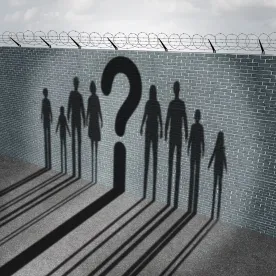Many Cubans who were making the long and dangerous trek through jungles and other countries to the United States before the inauguration of President Donald Trump on January 20 are waiting at the U.S. border for word from the Trump Administration on how they will be treated.
For decades, under the Cuban Adjustment Act (CAA), a Cuban national in the U.S. was eligible for a Green Card after being lawfully admitted and physically present in the U.S. for one year. The U.S. “wet-foot/dry-foot” policy, an exemption preventing the expedited removal of Cuban nationals apprehended near the border, allowed Cuba migrants who made it to “U.S. soil” to request parole and adjust status under the CAA. The policy also required those apprehended at sea be returned to Cuba or resettled elsewhere. Under the Cuban Medical Professional Parole Program, Cuban medical professionals who were “conscripted” to study or work abroad (not in the U.S. or in Cuba) by the Cuban government also were eligible to apply for parole abroad with their family members and come to the U.S., where they would be able to adjust status based on the CAA.
On January 12, 2017, in the last days of the Obama Administration, however, the DHS rescinded special policies for Cuban nationals, including the “wet-foot/dry-foot” policy and the Cuban Medical Professional Parole Program. These policies were based on the assumption that all individuals leaving Cuba were victims of persecution and eligible for asylum, DHS said. The 2017 changes were made in recognition of the reestablishment of full diplomatic relations with Cuba and are intended to “ensure regular, safe, and orderly migration” between Cuba and the U.S. The Cuban government has agreed to repatriate nationals who have attempted to enter the U.S. But Cubans who fear persecution will still be allowed to make claims of asylum. They will be treated in the same way as nationals from other countries in terms of parole.
The pre-January 20 policy changes caught Cuban migrants by surprise and many are still waiting at the border, waiting to hear whether Trump would undo the policy changes. During the presidential campaign, Trump criticized the Obama Administration’s attempts to improve relations with Cuba. On the other hand, Trump also has criticized the expanded use of parole.




 />i
/>i

